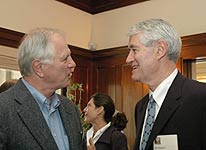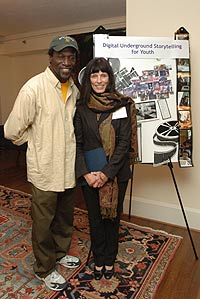Berkeleyan
Collaborating on community
Whether restoring marshland or bridging the digital divide, the campus and its East Bay partners work closely together
![]()
| 27 October 2004
 Berkeley Mayor Tom Bates (left) and Chancellor Birgeneau chatted at the University House reception recognizing the efforts of the campus and its community partners. (Peg Skorpinski photo) |
Hosted by Chancellor Robert Birgeneau and his wife, Mary Catherine, this year’s reception paid tribute to six programs that promote access to higher education, the application of technology to education and literacy, and a range of goals in the areas of public health, nutrition, community empowerment, and environmental stewardship.
“This has been a particular pleasure for Mary Catherine and myself,” said the chancellor, “because it gives us the opportunity to meet some of the more idealistic members of the campus and local communities.”
The 2004 projects recognized at this week’s event were these:
César Chávez Educational Center College-Going Project: In 2003, the Fruitvale community in East Oakland realized a longtime dream when the César Chávez Educational Center, a complex that houses two elementary schools, opened its doors. Berkeley’s Center for Educational Outreach, the Graduate School of Education, Cal Corps Public Service Center, and six community groups have collaborated over the past three years to increase student achievement and foster their expectations of college attendance.
 Digital Underground Storytelling for Youth co-directors Michael James of Oakland's Prescott Center and Glynda Hull of the Graduate School of Education. (Peg Skorpinski photo) |
Family Health/Salud Familiar: Established in 1997, Family Health improves health education in low-income urban communities in the East Bay with a program that involves students, their parents, and community participants. Lawrence Hall of Science and the School of Public Health’s Center for Community Wellness have collaborated with community partners, La Famila Counseling and Referral Service and the Hayward and Oakland school districts, to offer learners of all ages hands-on health-science activities related to food and nutrition, respiratory and heart health, and disease prevention.
Lower San Antonio Collaborative: The Community Partnerships Office of the campus's Institute of Urban and Regional Development and the Annie E. Casey Foundation have worked with East Oakland community organizations to identify potential sites for affordable housing in the district, develop an understanding of the community’s needs, and attract potential housing developers. To date, six sites are being pursued for between 90 and 120 housing units that will include such ground-floor services as a library, childcare, and health counseling.
Farm Fresh Choice and Richmond Field Station - Stege Marsh Restoration Community Stewardship Program: see links for details.

